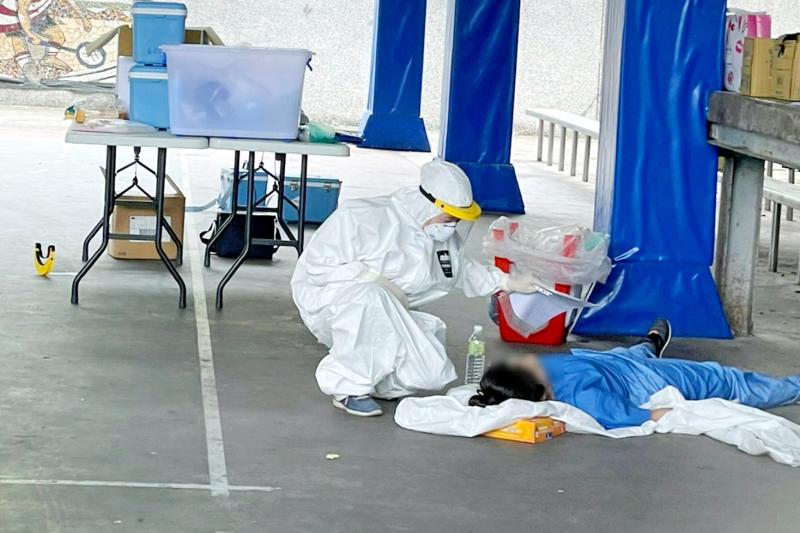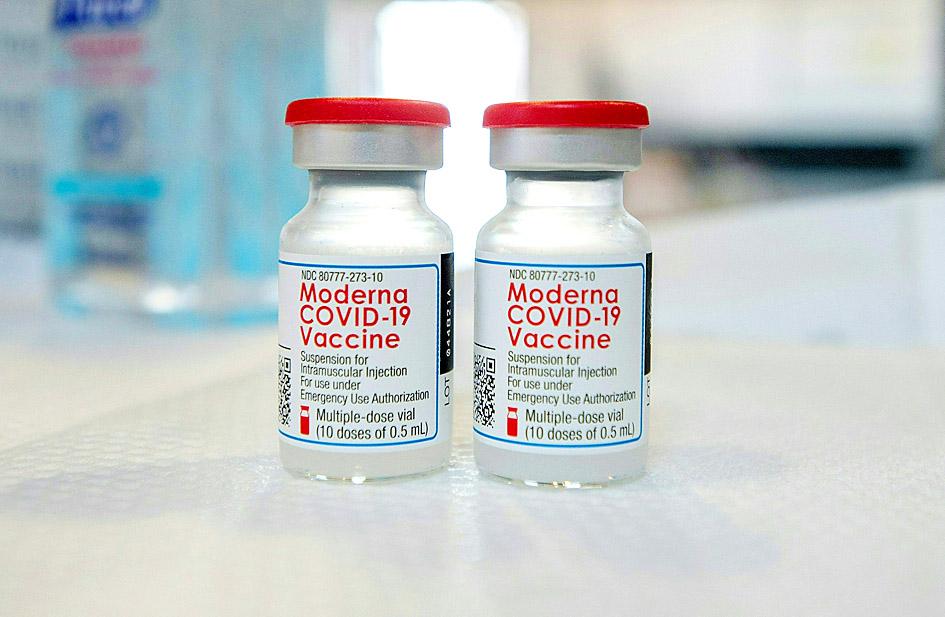BioNTech SE asked Taiwan to remove the words “my country” from a draft version of a news release that would have announced a vaccine deal, Minister of Health and Welfare Chen Shih-chung (陳時中) said yesterday, as the Central Epidemic Command Center (CECC) confirmed that 150,000 Moderna COVID-19 vaccines were expected to arrive today.
Talks with Germany’s BioNTech had begun on Aug. 20 last year, but discussions ended in January over the wording of a news release, said Chen, who heads the center.
The company on Dec. 31 last year provided a final version of a vaccine contract, which the center signed and returned on Jan. 6, and the next day, the center and the company exchanged views on what information would be disclosed about the deal, as the contract had included restrictions on what could be shared, he said.

Photo: CNA
On Jan. 8, the center provided the company with a draft news release in Mandarin and English, to which the company initially said it had no objection, he said.
However, hours later, BioNTech told the center that it “strongly recommends” removing the words “my country” (我國) that had appeared in the Mandarin version of the draft, he said.
The center immediately revised the wording to “Taiwan,” but on Jan. 15, the company told the CECC that the signing of the contract would be delayed by weeks due to a reassessment of global vaccine supply and an adjustment to the supply schedule, he said.

Photo: AFP
“It’s crystal clear to me that the contract was finalized,” Chen said.
“There’s no problem within the contract. The problem was something outside of the contract,” he added, without elaborating.
After the incident, Chen said that he would no longer report details about vaccine contracts while negotiations were in progress, and would instead wait until he was sure the vaccines would arrive.
The CECC confirmed local media reports, which first appeared on the Chinese-language Apple Online, that the first batch of 150,000 Moderna vaccines were expected to arrive this afternoon.
American Institute in Taiwan Director Brent Christensen, after giving a farewell speech on Wednesday, said that the US had not yet finalized its criteria for releasing a stockpile of vaccines to other countries, and that Taiwan’s infection rate was still among the lowest in the world, which drew criticism despite his popularity in Taiwan.
The Moderna vaccines were to depart from Luxembourg early today and arrive at Taiwan Taoyuan International Airport at 3:50pm, the CECC said in a statement.
The delivery would be just a portion of the 5.05 million COVID-19 vaccine doses that the US company committed to Taiwan on Feb. 8, the center said.
The shipment is to be directly transported to a designated storage facility for further inspection once it clears customs, it said.
Separately yesterday, Democratic Progressive Party (DPP) caucus whip Ker Chien-ming (柯建銘) confirmed media reports that he had spoken with Hon Hai Precision Industry Co (鴻海精密) founder Terry Gou (郭台銘) on Sunday about purchasing doses of the BioNTech vaccine.
However, the negotiations to purchase 5 million doses of the vaccine through Shanghai Fosun Pharmaceutical Group (上海復星醫藥集團) fell through at the last minute, and they have not heard from the company since Tuesday, Ker said.
“Gou told me that vaccine purchase efforts should not be caught up by politics,” Ker said.
The Chinese Nationalist Party (KMT), which is proposing that city and county governments be permitted to negotiate their own deals to acquire vaccine shots, might be oversimplifying things, Ker said.
Nantou County Commissioner Lin Ming-chen (林明溱) of the KMT had said he supported reaching out to Fosun Pharma on behalf of the county government to negotiate a purchase deal.
Meanwhile, the CECC said it was to begin distributing about 410,000 doses of the AstraZeneca COVID-19 vaccine that arrived on Wednesday last week.
The vaccines, which were the second shipment received through the COVAX initiative, would be distributed in two stages, said Deputy Minister of the Interior Chen Tsung-yen (陳宗彥), who is deputy head of the center.
Additional reporting by Reuters

A magnitude 5.6 earthquake struck off the coast of Yilan County at 12:37pm today, with clear shaking felt across much of northern Taiwan. There were no immediate reports of damage. The epicenter of the quake was 16.9km east-southeast of Yilan County Hall offshore at a depth of 66.8km, Central Weather Administration (CWA) data showed. The maximum intensity registered at a 4 in Yilan County’s Nanao Township (南澳) on Taiwan’s seven-tier scale. Other parts of Yilan, as well as certain areas of Hualien County, Taipei, New Taipei City, Taoyuan, Hsinchu County, Taichung and Miaoli County, recorded intensities of 3. Residents of Yilan County and Taipei received

Taiwan has secured another breakthrough in fruit exports, with jujubes, dragon fruit and lychees approved for shipment to the EU, the Ministry of Agriculture said yesterday. The Animal and Plant Health Inspection Agency on Thursday received formal notification of the approval from the EU, the ministry said, adding that the decision was expected to expand Taiwanese fruit producers’ access to high-end European markets. Taiwan exported 126 tonnes of lychees last year, valued at US$1.48 million, with Japan accounting for 102 tonnes. Other export destinations included New Zealand, Hong Kong, the US and Australia, ministry data showed. Jujube exports totaled 103 tonnes, valued at

TRUST: The KMT said it respected the US’ timing and considerations, and hoped it would continue to honor its commitments to helping Taiwan bolster its defenses and deterrence US President Donald Trump is delaying a multibillion-dollar arms sale to Taiwan to ensure his visit to Beijing is successful, a New York Times report said. The weapons sales package has stalled in the US Department of State, the report said, citing US officials it did not identify. The White House has told agencies not to push forward ahead of Trump’s meeting with Chinese President Xi Jinping (習近平), it said. The two last month held a phone call to discuss trade and geopolitical flashpoints ahead of the summit. Xi raised the Taiwan issue and urged the US to handle arms sales to

BIG SPENDERS: Foreign investors bought the most Taiwan equities since 2005, signaling confidence that an AI boom would continue to benefit chipmakers Taiwan Semiconductor Manufacturing Co’s (TSMC, 台積電) market capitalization swelled to US$2 trillion for the first time following a 4.25 percent rally in its American depositary receipts (ADR) overnight, putting the world’s biggest contract chipmaker sixth on the list of the world’s biggest companies by market capitalization, just behind Amazon.com Inc. The site CompaniesMarketcap.com ranked TSMC ahead of Saudi Aramco and Meta Platforms Inc. The Taiwanese company’s ADRs on Tuesday surged to US$385.75 on the New York Stock Exchange, as strong demand for artificial intelligence (AI) applications led to chip supply constraints and boost revenue growth to record-breaking levels. Each TSMC ADR represents